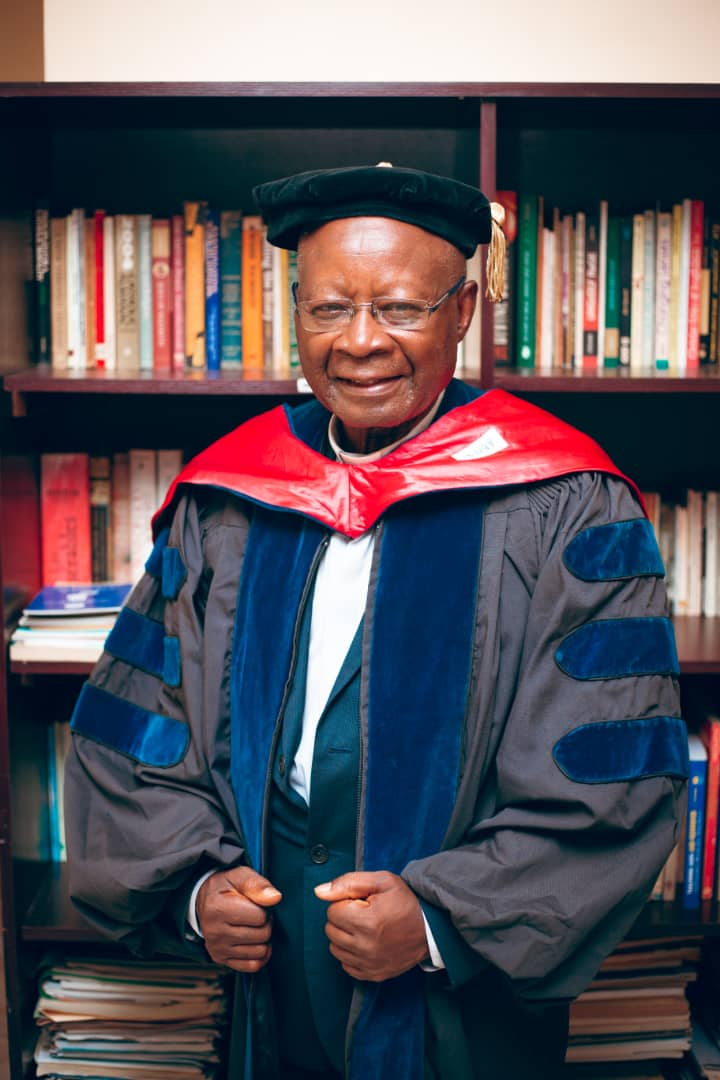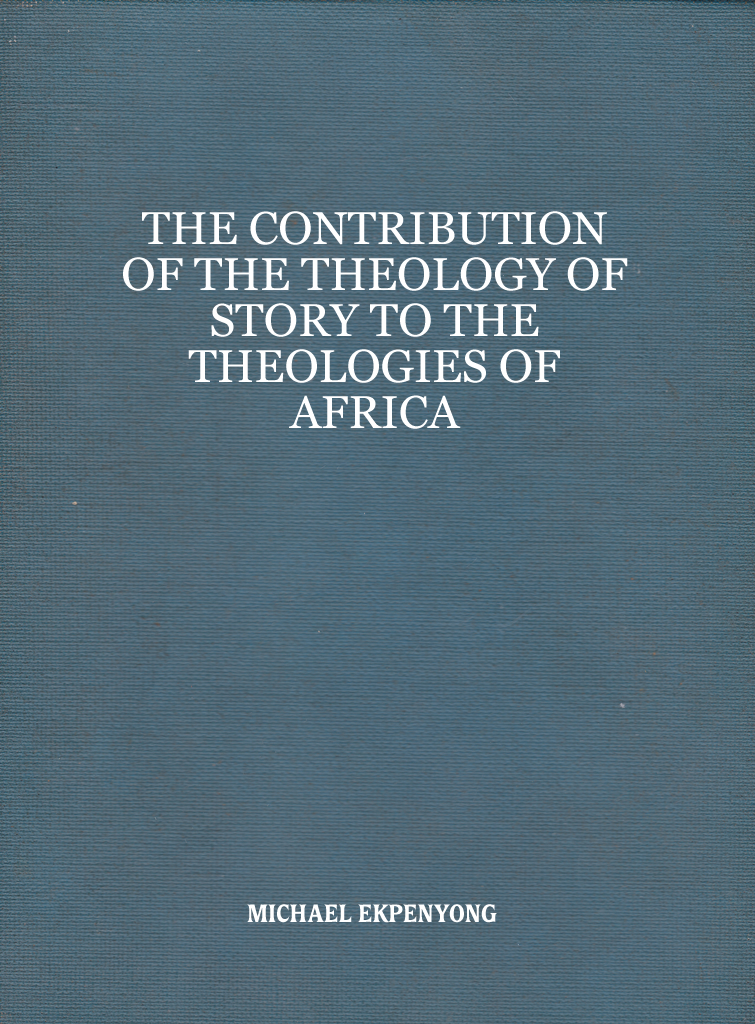The Contribution of The Theology of Story to The Theology of Africa
$10.00
PREFACE
This dissertation relying on the insights of Vatican 11 stresses the reality of
human experience as the context of divine revelation. The Constition on Divine Revelation brings us to this awareness when it speaks of revelation as God’s
self-communication to humanity (D.V.2). It further asserts that divine discourse
through the Incarnate Word has been made like human discourse(D.V.13).
In this preface I want to acknowledge some unique experiences that underlie
the stories of the divine-human relationship in this dissertation.
In the Fall of 1985 I went to Professor William Thompson to discuss a
possible topic for a paper on hermeneutics. “Why not do something on some aspects
of Africa that you are familiar with?”, Thompson asked. My response was a paper
with the title “African Theologies Toward A Dialogue With Christianity”. This dissertation is the intensification of the 1985 paper. I accept full responsibility for the entire study. My awareness of this responsibility, however, could not have come without Thompson’s consistent constructive critiques. Professor Thompson you deserve that gentle but grace—ful African way of expressing gratitude. “SOSONHO ETTE!” (’Thanks Sir!).
I did another paper on “Prophetism” for Professor ‘Marilyn Schaub in the Fall oi’ 1985. In that paper I celebrated the dance of the African medicine-man in the rare experience that l called “Baddadash”. It took me time to come to acknowledge dancing as a unique language event of the traditional African and my Africanity. This dissertation is the deepening of the original dance with the class of 1985. Finding myself drawn more and more into the dynamics of this whole study I now
seem to have come to some understanding of dance as a text of transcendence.
Professor Schaub you enabled and encouraged me to the discovery of this vital
aspect of the traditional African route to trascendenee. “SOSONHO MMA!(Thanks
Wornan!).
In the Spring of 1986, I wrote a terribly long paper on African liberation theology for Professor James Hanigan. This dissertation cannot be compared to the paper of 1986 because of its outrageous length. Worse still my long writings have been polluted with mistakes. Professor I-lanigan has done the energy zapping work of critically suggesting possible ways of putting the pieces together. Professor Hanigan SOSONGO ETTE! for your unquestioned commitment to excellence.
The Chair, the staff, and the students of the Dept. of theology deserve a word of thanks for support at the most difficult moments of writing the dissertation. To the University of Duquesne l proffer my deep appreciation for financial assistance during my graduate studies.
I thank in a special way my spiritual mentor, Most Rev. Dr. E. S. Obot for spiritual support and for introducing me to African literary works. To my bishop, Most Rev. Dr. B. D. Usanga, l owe thanks for introducing me to the pastoral experiences of Calabar diocese for five years. To the priests, the religious and the people of Calabar diocese I share the fruits of this dissertation in the hope that we
will be able to recomrnit ourselves to the faith that we profess. The following people have been positive influences on me before and during the writing of the dissertation. Dr. and Dr.(Mrs.) Akpan A. Otu, Mr. and Mrs. Gabriel Ogar, Mr. and Mrs. Cornelius Achima, Dr. and Mrs. Emmanuel Ukpong,
Okuku Emmanuel Essien and family, Mr. and Mrs. Joseph Udo, Mr. Nkpoette Efangha, Professor and Okon Uya, Mr. and Mrs. David Udo, Mr. and Mrs. Cletus Onah, Mr. Michael Ndorng, Mr. and Mrs. Dominic Effiong, lvlr. and Mr. Michael Eyo, and Mr. and Mrs. William Nordling, Mr. and “firs. Anthony Udofia. You all have been catalysts for this dissertation. ABAS1 ODIONG MBUFO!
My special thanks also go to Dr. Joan I-iuber, Veronica Romano, Sr. Phyllis Scello, Sr. Charlene Schaaf, Mr. Joseph Healy, Frs. Joseph Kunju, John Marcucci, Ed. Schieicher, Neil McCaulley, Lou Valone, Morgan Walsh, Joseph Bryan, Joseph Kurutz, Robert Turner and Monsignor Matthew Dubee. My thanks also go to the pastors and parishoners of St. Joseph, Holy Name in Duquesne, Nativity Church, North Side, St. Jerome, Charieroi, and St. Raphael, Morningside.
A word of appreciation goes to Dr. and Mrs. Francis Brown for financially supporting the typing of this dissertation. Also, I sincerely thank Miss Becky Lombardi, Mrs. Jan Roch, Mrs. Beth Iammarino and Mrs. Grace Manuel, for stretching their spaces and times to type for me when I badly needed extra hands.
Through this dissertation I want to thank You my God for the community of persons that You have given to me. Through people You have taught me one truth about Your mystery. You our God, You live where we live and are a community.
Description
1. AN AFRICAN TRADITIONAL CONTEXT
– The Efik-lbibio people of Old Calabar, Natural Environment, Economy, Social Organization
– The Efik-lbibio Worldview
– Conclusion
– Notes on Chapter
2. A CRITICAL REVIEW OF THE MODELS OF THE EMERGING THEOLOGIES OF AFRICA
– Adaptation Model
– Translation Model
– Contextualization Model
– Toward a Rapproachment of the Models
– The Problem of Theology for traditional Africans
– The Response of the Magisterium
– Conclusion
– Notes on Chapter 2
3. THE RELATION BETWEEN STORIES AND THEOLOGY
– The Historical Background
– What is a Story?
– The Truth claim of Stories
– Story: An Implicit Theology?
– Imagination and Story Theology
– Story and other Narrative Forms
– The Philosophical-Theological Approach in Story Theology
– Stories of God: An Unauthorized Biography
– The Contribution of Story Theology
– Final Comments
– Notes on Chapter
4. STORIES IN AFRICAN TRADITION
– First Dimension:Traditional Story-telling
– Second Dimension: Efik-lbibio Folklore
– The Third Dimension: The Contributions
– Conclusion
– Notes on Chapter 4
5. THE THEOLOGICAL TASK: THE CRITICAL CORRELATION
– Reflecting on the Literary Method
– The Accord Between the African and Christian Tradition
– The Challenge for Traditional African:
– The African Ideal of Community and the Reality of the Person
– The Future Task for African Christian Theology
– Story and Conclusion
– Notes on Chapter 5

MSGR Michael Ekpenyong
Michael Otto Ekpenyong is a Catholic Priest who holds a Masters Degree in Philosophy and Doctorate Degree in Systematic Theology from Duquesne University Pittsburg, U.S.A. At the Catholic Secretariate of Nigeria, he served at the Secretary General for a couple of years. In September 2012, he was appointed Papal Chamberline (Chaplain to the Holy Father) by his Holiness Pope Benedict XVI. He is the author of Story telling Imagination and God-Talk (2002) and Beware of gods (2005), The John and the Paul in John Paul II (2010) and much more which can be accessed here.
Questions and Answers
You are not logged in
